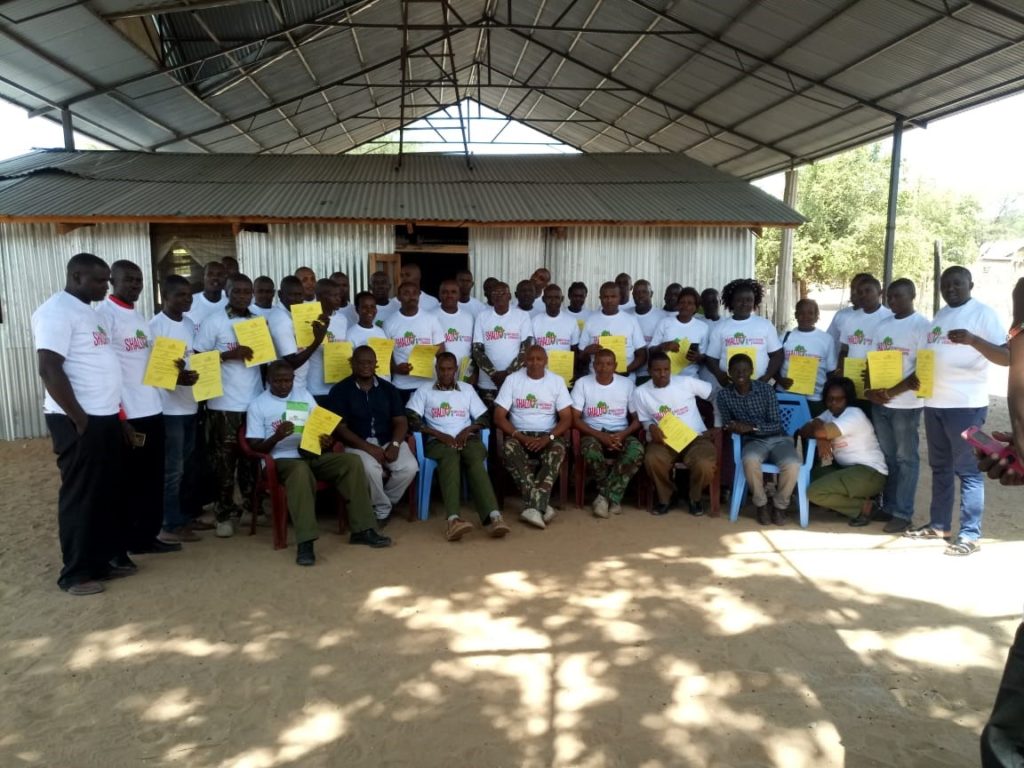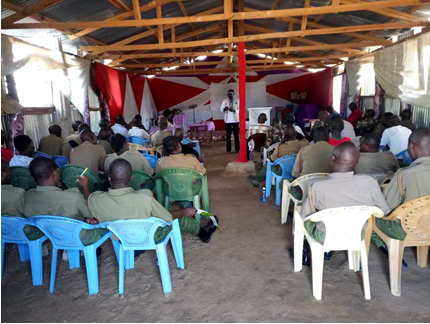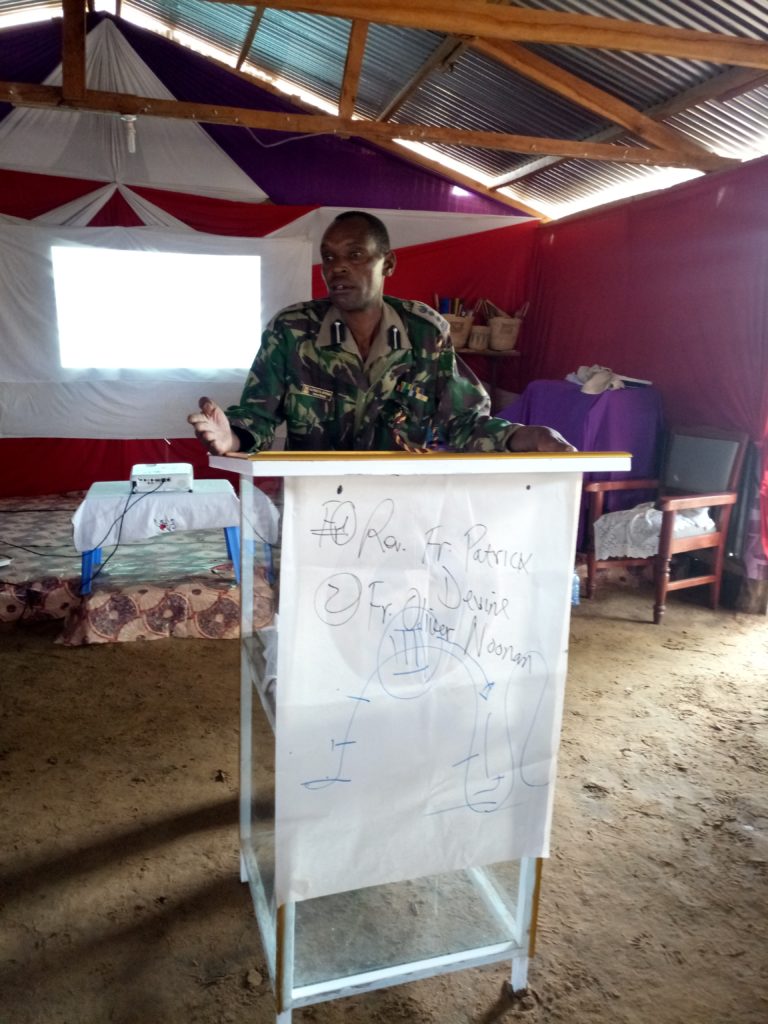“SCCRR`s training on conflict early warning and early response puts forward the framework for timely response to prevent the use of bullets by addressing the root causes of conflict that create and sustain peaceful societies,” (Mr. Nthiga, Turkana County Police Commander).

Shalom’s Team with Security Agents (Administrative Police & Regular Police), District Peace Committees and Representatives from the Turkana County Government after a training in Lodwar, N.W Kenya
For ten years, Shalom Centre for Conflict Resolution and Reconciliation (SCCRR) has successfully worked for peace and sustainable development. To realize a society free of physical violence and unjust social structures leading to sustainable peace, social justice and reconciliation are key objectives. SCCRR peacebuilding initiatives seek to encourage the development of the conditions, attitudes and behaviour that foster and sustain social and economic development that is peaceful, unwavering and prosperous. SCCRR has worked to promote the optimum environment for human potential to flourish: at a personal level, relational level, cultural level and structural level.
SCCRR peacebuilding activities are designed to contribute to ending or avoiding armed conflict, in its wake, or to prevent a conflict from escalating violently. Activities undertaken as peacebuilding and conflict mitigation strategy by Shalom include: Empowering local community leaders with conflict transformation analytical skills and peacebuilding techniques as a forerunner to problem-solving workshops; Conducting research into the root causes of the conflict so as to inform local conflict transformation interventions and policy direction for advocacy; Influencing national and regional (IGAD countries) peace and development policies; Strengthening the role of religious organizations, civic organizations, and NGOs in Eastern Africa, with conflict transformation capacities; and Developing interethnic schools and institutions, design and promote peace education syllabus into educational institutes, provision of solar energy, construction of classrooms, desks, books etc, especially in areas of entrenched violent conflict.
SCCRR’s approach to sustainable peace has its conceptual origins in the distinction between “positive peace” and “negative peace” developed by Johan Galtung. Whereas negative peace is defined as the “absence of direct and organized violence among adversaries”, the notion of positive peace is part of a longer-term conception according to which establishing sustainable peace is made possible through cooperation between adversaries and the eradication of the underlying causes of the conflict, or simply put as the presence of attitudes, institutions and structures which create and sustain peaceful societies. (Galtung 1975:29).
Violent conflicts involving different ethnic communities in Turkana County have a long and violent history. They were becoming increasingly destructive and less manageable. The Turkana are a nilotic people in northwest Kenya, a semi-arid climate region bordering Lake Turkana in the east, Pokot, Rendille and Samburu people to the south, Uganda to the west, and South Sudan and Ethiopia to the north. The Turkana often find themselves in conflict with these bordering communities. These conflicts have been associated with ad hoc interventions that lack understanding of the root causes. These underlying causes which SCCRR have researched rigorously are linked to a variety of issues related to the overall detrimental lack of essential institutions necessary to meet basic human security. This is very apparent in infrastructure insecurity, inadequate State security arrangements, competition over control and access to natural resources such as pasture, water, and oil, land issues, political-economy incitements, ethnocentrism, the proliferation of illicit arms and appalling poverty and unemployment.

An ongoing session facilitated by Dismas Ndamwe- Regional Coordinator National Steering Committee (NSC), North Rift, Kenya
In such a volatile region, SCCRR was invited by the government peacebuilding coordinator, North Rift Region Dr. Dismas Ndamwe to train government officials on methodologies of conflict analysis and prevention. In the Month of January, 2019, the organization offered its expertise to develop the capacity of government officials. The workshop was on conflict early warning and early response strategy to peacebuilding.
Early warning as defined by Jonathan Whittall denotes initiatives that focus on systematic data collection, analysis and/or formulation of recommendations, including risk assessment and information sharing. The purpose is to initiate or draw an early response that happens at the latent stages of an anticipated violent conflict, with an aim of averting, lessening, resolving, or changing circumstances that may increase the likelihood of violent conflict breaking out. The workshop covered some of the most crucial activities in the course of early warning; information gathering and verification, analysis, mapping and monitoring, and estimation of risks, informing, advocacy, monitoring, and evaluation. The aim of this workshop was: to enhance the capacity of government officials on Conflict Early Warning and Early Response Skills as an approach to conflict prevention.
The workshop facilitated by SCCRR staff; Dr. Peterlinus Odote, Paulson Erot, MA, and Cyprian Nyakundi, MA candidate, was attended by 53 senior national and county governments officials, including the police and public service officers. At the end of the workshop, the participants were able to comprehend the whole space of Conflict Early Warning and Early Response Systems with a view of applying the concept to improve security in Turkana County. The participants were empowered to identify conflict early warning indicators and also design conflict early warning systems applicable to their operational context.
 SCCRR is widely known in the Horn of Africa to be an important results based organization in peacebuilding. It is recognized for its important role in transforming violence to peace, and in facilitating the conditions necessary for a sustainable human security and development. SCCRR’s expertise and role in conflict-affected regions has been highly commended. The latest indication is the Turkana County commander`s statement (January, 2019) highlighting the comparative advantage of SCCRR in facilitating the workshop for the police and county government officials: “SCCRR offers a new way of conceptualizing the way communities can develop in order to sustain peace or to recover from conflict. The work of the police has too often been responding to violence outbreak or the threat of violence. SCCRR derived the Positive Peace scheme of responding to the lack of prevailing guidelines our county could use in our journey towards meeting peace. SCCRR`s training on conflict early warning and early response puts forward the framework for timely response to prevent the use of bullets by addressing the root causes of conflict that create and sustain peaceful societies,” (Mr. Nthiga (inset) Turkana County Police Commander during closing ceremony).
SCCRR is widely known in the Horn of Africa to be an important results based organization in peacebuilding. It is recognized for its important role in transforming violence to peace, and in facilitating the conditions necessary for a sustainable human security and development. SCCRR’s expertise and role in conflict-affected regions has been highly commended. The latest indication is the Turkana County commander`s statement (January, 2019) highlighting the comparative advantage of SCCRR in facilitating the workshop for the police and county government officials: “SCCRR offers a new way of conceptualizing the way communities can develop in order to sustain peace or to recover from conflict. The work of the police has too often been responding to violence outbreak or the threat of violence. SCCRR derived the Positive Peace scheme of responding to the lack of prevailing guidelines our county could use in our journey towards meeting peace. SCCRR`s training on conflict early warning and early response puts forward the framework for timely response to prevent the use of bullets by addressing the root causes of conflict that create and sustain peaceful societies,” (Mr. Nthiga (inset) Turkana County Police Commander during closing ceremony).
Important lessons learned by the participants include the multi-dimensional nature of peacebuilding, the inter-dependence of its different parts, and the wide range of different expertise and activities that are possible to mitigate violence. It has been learned that sustainable peace and development must be responsive to the root causes of conflict. There is recognition of a major need for coordination within and between all conflict transformation actors. Recommendations to correct the strategic deficit fall under four headings – empirical research, capacity building, policy priority, and evaluation. The past has to acknowledged, the present reframed and a realistic future envisioned. SCCRR hopes that the knowledge gained from this workshop will be of value not only to the participants, to the Turkana community who live in a very volatile area and to governments and other peacebuilding actors working in the region. SCCRR was thanked for making its unique and distinctive contributions to peace and development. “To our DONORS and fundraising efforts, you continue to make a life-changing contribution again.”
By
Peterlinus Ouma Odote, Ph.D
Director of National Strategy, Shalom Center for Conflict Resolution and Reconciliation (SCCRR)

